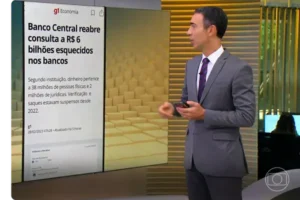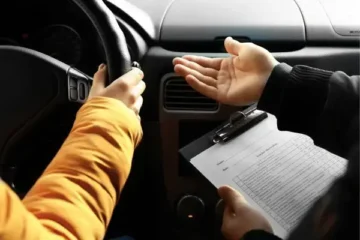Can the government confiscate securities seized in bank accounts?
Advertisement advertisements
Governo pode confiscate seized securities in bank accounts? Understand what happens to your unresolved money and how to ensure it is recovered.
[p2]In recent months, there has been much talk about the possible confiscation of securities seized in bank accounts by the government.
This discussion raised doubts and concerns, especially for those who have money accumulated in inactive accounts or in other financial institutions.
Can the government confirm hidden values?
The possibility of the government confiscating securities seized in bank accounts raised questions and generated insecurity among citizens.
The news that the government would be able to use scarce securities led many to wonder if its resources would be at risk.
The discussion on the use of forfeited securities gained strength after the government announced the extension of the waiver of the folha de pagamento for strategic sectors of the economy, using resources that were available in the Sistema de Valores a Receber (SVR).
As a result, many people believed that these securities would be permanently confiscated, without the possibility of recovering the money.
Can the government really confiscate these resources? What are the rights of the holders?
In the following, we will clarify these points and provide detailed information on what really happens with these values.

O que São os Valores Esquecidos?
Before understanding whether the government can confiscate seized assets, it is important to know what these resources are.
Estimated values refer to amounts that, for different reasons, have not been moved or released by their owners.
Examples of Expended Money That Can Be Collected
- Inative Bank Accounts:
When a bank account is not moved for a long period of time, it may become inactive. If there is a declining balance, it can be recorded in the Securities Receivable System (SVR). These values include balances of current accounts, savings or investments that have not been redeemed. - Letters of Credit:
Values related to cashback, returns or unreturned credit card credits are also classified as cash forfeited. When the holder does not redeem the balance accumulated in cashback or when a purchase is completed and the value is not transferred to an active account, this money can be registered as value to be received. - Consórcios e Cooperativas:
Participants of consórcios that were not contemplated or that left before the conclusion may have leftover values paid. Many times, administrative fees or parcel refunds are deducted and recorded as available values in the system. - FGTS:
Inative accounts of Service Time Guarantee Fund (FGTS) may also have accumulated balances that were not withdrawn by the employee after leaving employment. These values are available for withdrawal upon request.
These resources are often lost due to lack of knowledge, financial disorganization or even low values that go unnoticed.
The Sistema de Valores a Receber was created by the Central Bank precisely to centralize this information and facilitate access by holders.

How does the Sistema de Valores a Receber (SVR) work?
O SVR is a tool made available by the Central Bank of Brazil that aims to help citizens to consult and retrieve missing values.
It allows any individual or legal entity to consult, through the CPF or CNPJ, if there are securities available in financial institutions.
- Simple and Free Consultation: The consultation is made through the official site of the Central Bank, at the following address valoresareceber.bcb.gov.br. From the login with the gov.br account, it is possible to visualize if there are values to be rescanned and, if there are, what are the steps to request the rescan.
- Access Security: Access is protected and requires a gov.br account with a gold or silver security level. This ensures that only the account holder can access its resources, preventing fraud.
Is there any confiscation of government-held securities?
The idea that the government could confiscate securities seized in bank accounts generated a great deal of debate.
However, it is important to differentiate between confiscation and collection. Let's understand what really happens with these values.
Understand if the government can confiscate seized securities in accounts
The term "confiscation" refers to the appropriation of goods without the possibility of return, generally occurring arbitrarily or without the consent of the owner.
In the case of the values of bank accounts, there is no confiscation no sentido estrito da palavra.
According to information from the government and the financial authorities, what is occurring is as follows recovery of unclaimed amounts after the expiration of the deadline.
These resources are transferred to the National Treasury and are used in public policies, such as the de-recognition of the payment folio of strategic sectors.
However, these values do not cease to belong to the holder and can be claimed for up to 25 years after their transfer.
Nota Oficial do Governo: Clarification on Confiscation of Seized Securities
O governo brasileiro, por meio de uma official noteHe clarified that there is no confiscation of forfeited values.
The Central Bank also stated that the securities that are not redeemed are collected to ensure that they are used in a useful and responsible manner, instead of remaining idle in financial institutions.
This does not mean that the money is lost; it remains available to the holder for up to 25 years.
Difference Between Confiscation and Collection of Forfeited Securities
- Confisco: Permanent and non-refundable ownership.
- RecolhimentoTransfer of unclaimed amounts to the National Treasury, with the possibility of withdrawal at any time within the established term (25 years).
Therefore, what happens with the values that have been lost is a recolhimento and not a confiscation. The holder retains the right to retrieve the money even after its transfer.
Why does the Government Collect Scarce Values?
The missing values that are not claimed within the deadline are collected by the government, but this measure has a clear and practical justification. Let's understand why this happens.
Objective of the Government to Recollect Stolen Values
The main objective of the collection of forfeited securities is to prevent money from going unused and losing value over time.
When these resources are tied up in inadequate accounts or are hidden in financial institutions, they cease to have a positive impact on the economy.
The transfer of these values to the National Treasury allows them to be used in public policies and programs that benefit society as a whole, ensuring that the money is applied productively.
How does the government use the resources of the collected foregone values?
The resources collected are used to offset public expenditures and support initiatives that promote economic growth.
Recently, for example, part of these values was used to extend the payroll deduction of important economic sectors, helping to reduce the cost of employment and stimulating the hiring of workers.
Transparency in the Use of Values that the Government Collects, but Does Not Confiscate
The use of these securities is done in a transparent manner, following the norms and laws in force.
The Ministry of the Treasury publishes editions informing about the values collected, and the holders are notified about the possibility of withdrawal.
Thus, even after the transfer of the resources to the Treasury, the holder's right of ownership is preserved, and he may claim the money at any time.
O que Acontece se os Valores Não Forem Forem Resgatados?
When the holder of the forfeited securities does not make the repayment within the specified period, the resources are transferred to the National Treasury.
We will understand how this process works and what happens after the transfer.
Time to Restore Values Before the Government Recolher
After the publication of a notice by the Ministry of the Treasury, the holders of the forfeited securities have a term of 30 days to answer the claim and make the refund directly with the financial institution.
If the refund is not made during this period, the values are collected by the government.
Transfer to the National Treasury in Case of Non-Resettlement of Forfeited Securities
The amounts that are not redeemed within the initial period of 30 days are transferred to the National Treasury.
This transfer does not imply the definitive loss of the right to the resources. The holders can still claim the money, but now the process can be a little more complex, requiring legal action.
Resgate Available for Up to 25 Years After Collection, Without Definitive Confiscation
Even after the transfer to the National Treasury, the holder has a period of 25 years to request or resgate two values.
During this period, the money can be requisitioned at any time, guaranteeing that the holder does not lose the right to the resources.
This possibility of long term redemption is an important guarantee for those who, for some reason, were unable to redeem the money within the initial term.
Myths and Truths about the Confiscation of Stolen Securities
The controversy over the possible confiscation of foregone values has generated a series of myths and misinformation.
Below, we demystify some of the main points:
Myth: The Government will permanently confiscate seized securities
- Verdade: The government does not definitively confiscate forfeited assets. The resources are collected for the National Treasury, but continue to belong to the holder and may be kept for up to 25 years. Confiscation, in the sense of definitive loss, does not occur.
Myth: All the values are automatically lost.
- Verdade: The values are not automatically lost. They remain available for redemption for a long period, and the holder is notified about the redemption and redemption periods.
Difference Between Confiscating Forfeited Securities and Using Them Temporarily
- Confisco implies a definitive loss, as long as the recolhimento The securities allow the temporary use of the resources by the government, maintaining the holder's right of withdrawal at any time within the term.
How can you guarantee that your values will not be stolen or collected?
There are some practices that can be adopted to prevent securities from being stolen and to ensure that the holder does not miss the opportunity to recover them.
Let's see some of them:
1. Regularly consult the System of Values to Receive (SVR) to avoid the confiscation of missing values.
The Receiving Values System is the main tool to ensure that the values identified are located and retrieved in a timely manner.
It is advisable for anyone to consult the system regularly, as new values may be added as they are identified by financial institutions.
2. Keeping Financial Information Organized to Avoid Distressed Securities
One of the main reasons why securities are undervalued is financial disorganization.
Keeping up-to-date records of bank accounts, credit cards, partnerships and other financial transactions can help prevent money from being left behind.
3. Accompanying Government Publications and Press Releases on Deadlines for Resale
The Ministry of the Treasury publishes editions with information on the values collected and the deadlines for repayment.
Accompanying these publications ensures that you never miss an opportunity to recover your resources.
Despite the controversies and incorrect information circulating, it is important to emphasize that the government does not confiscate confiscated securities permanently.
Unclaimed resources are collected by the National Treasury, but the holder retains the right to keep them for up to 25 years after the transfer.
Regularly consulting the Sistema de Valores a Receber, keeping your financial information organized and following the repayment deadlines are essential attitudes to guarantee that the money you have lost is recovered and used in a conscious way.
These resources are theirs by right, and it is worth the effort to obtain them.
Do not fail to take advantage of this opportunity and keep control of your securities, ensuring that they are not collected without your knowledge or consent.
The responsibility for guaranteeing the recovery lies with the holder, and, with the help of the tools made available by the government, this can be done in a safe and practical manner.





